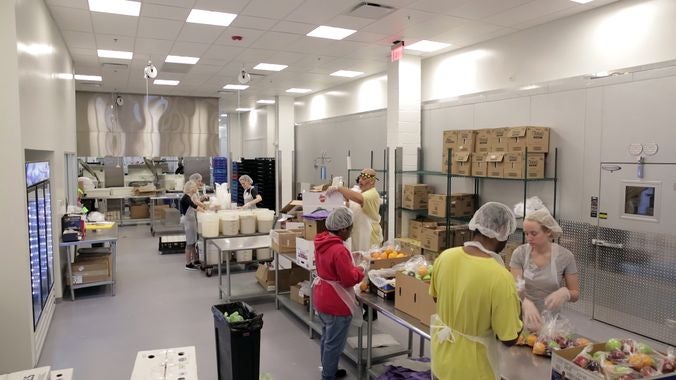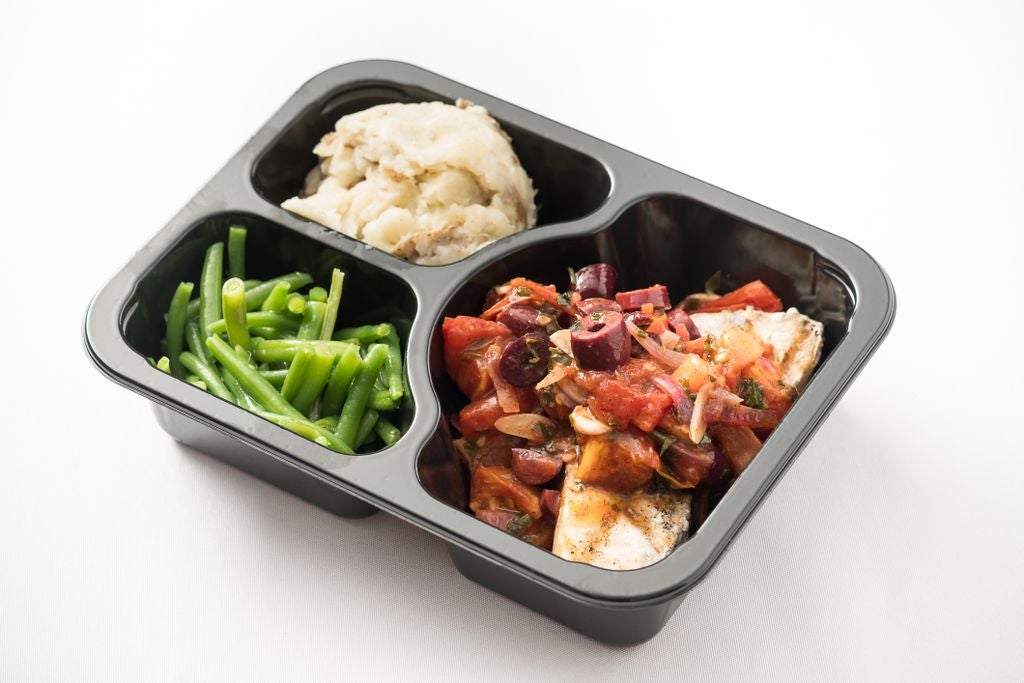New MANNA Institute to lead ‘food is medicine’ push
Insurance companies don’t cover most meal plans — because there’s not enough research to prove they should.

Workers in MANNA's kitchen (Provided)
This article originally appeared on BillyPenn.
—
Six years ago, a Philly nonprofit demonstrated that healthy meal plans could be as effective as medicine.
The Metropolitan Area Neighborhood Nutrition Alliance, better known as MANNA, published its first round of groundbreaking “food is medicine” research in 2013. National attention followed, along with the start of a push to convince health insurance companies to cover prescribed diets as a method of preventative treatment.
But major expansion of coverage to include meal plans still hasn’t happened. Advocates say there hasn’t been enough followup research, or people committed to making it happen.
Today, that issue gets addressed head on with the launch of The MANNA Institute.
The new division of the organization — which has brought meals to over 26,000 Philadelphians at nutritional risk over the past three decades — will be entirely dedicated to initiatives that will explore the impact of diet on health.
There’s only one staffer at the Institute so far, but that number is expected to grow. CEO Susan Daugherty said her staff and their army of 6,500+ volunteers are excited to dive in and study how malnourishment affects specific diagnoses. They’ll also be looking for ways to qualitatively support the notion that getting a bowl of chicken noodle soup delivered when you’re ill can impact health in a positive, meaningful way.
“There isn’t enough research in the field of food medicine to convince insurance companies,” Daugherty explained to Billy Penn. “When someone receives a prescribed diet, no one really thinks about how someone is going to be able to access that diet.”
Some of MANNA’s clients are on complex diets that call for fluid restriction or for a certain number of grams of phosphorous daily, she said, and meeting those requirements can be expensive, confusing and time-consuming.
Out of the approximately 1,300 people MANNA serves daily, only 300 are currently reimbursed through insurance partners for their meal plans.

Healing people with food
MANNA has been around for 29 years. Per Daugherty, in the first decade of the organization, MANNA was all about providing nourishment through comfort during the AIDS epidemic. She joined the nonprofit in 1999 as a registered dietitian. “Most of the first people I served died quickly,” she remembered. “The door was always revolving.”
With the advancement of preventative technology for HIV, MANNA shifted its mission and amplified its reach to provide “food as medicine” for clients with over 85 different illnesses. Through the entirety of the organization’s work, it has served over 14,000,000 medically-tailored meals.
MANNA currently offers eleven different diet modifications, and clients can be on up to three of them at a time:
- Kidney Friendly: low potassium, low phosphorus, low sodium
- Diabetic/Heart Healthy: carbohydrate and sodium controlled
- Low Lactose: low in dairy
- G.I. Friendly: low fiber and mild spice
- No Pork
- No Beef
- No Seafood
- Mechanical Soft: easy to chew and swallow
- Pureed
- High Calorie/High Protein: includes an additional healthy snack
- Children’s Menu
MANNA’s model has been replicated elsewhere, including in California, where a statewide meal delivery program was based in part on the research done in Philadelphia.
“We’re hoping our research can influence policy across the country,” said MANNA events manager Laura Payne. “We really believe here that evidence and action makes policy.”
Along with the Institute’s initial staffer, there are nine prominent health professionals on the advisory board, Payne said, hailing from a variety of local and national universities and hospitals.
Daugherty and Payne estimate MANNA has the capacity in its facility to cook and store double the amount of food that they serve,up to 2.8 million meals per year. With offsite storage, and a 24-hour kitchen, they estimate that could jump to 8 or 9 million meals annually. But that type of scale is impossible with a budget that relies primarily on philanthropic donations, they said — hence the push to convince insurance companies to get on board.
The MANNA Institute is possible thanks to generous funding from the organization’s founders and an anonymous donation made in Daugherty’s honor.
 Billy Penn is one of more than 22 news organizations producing Broke in Philly, a collaborative reporting project on economic mobility. Read more at brokeinphilly.org or follow at @BrokeInPhilly.
Billy Penn is one of more than 22 news organizations producing Broke in Philly, a collaborative reporting project on economic mobility. Read more at brokeinphilly.org or follow at @BrokeInPhilly.
WHYY is your source for fact-based, in-depth journalism and information. As a nonprofit organization, we rely on financial support from readers like you. Please give today.




